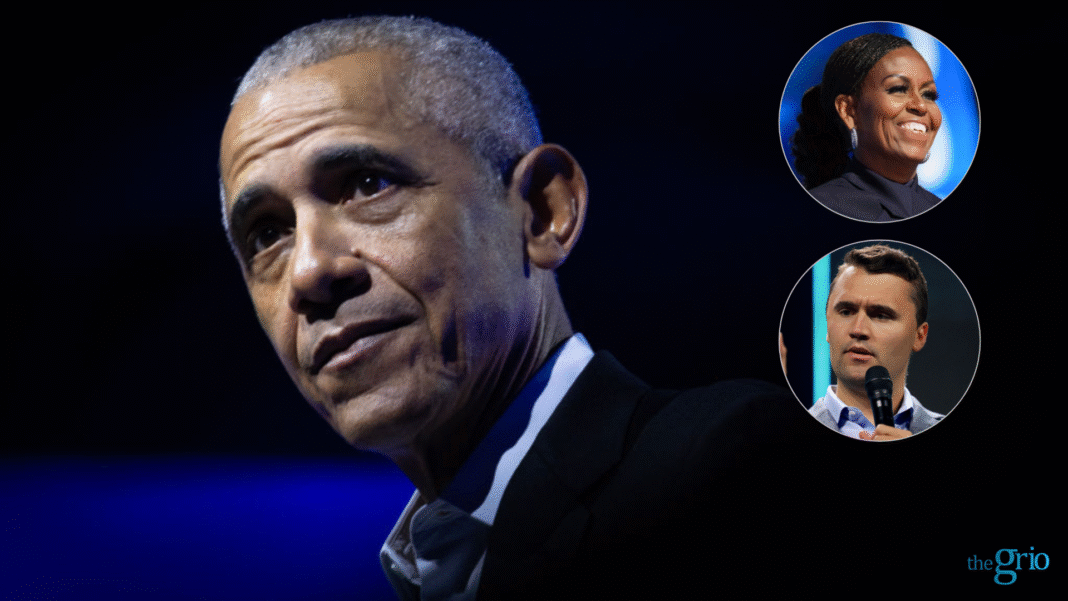Barack Obama’s Remarks in Erie, Pennsylvania: Addressing Controversy with Poise
This week, former President Barack Obama captivated a live audience in Erie, Pennsylvania, tackling a range of pressing topics that resonate deeply in today’s political climate. His remarks spanned from critique of political discourse to an examination of recent incendiary comments made by conservative commentator Charlie Kirk. The backdrop of his address was not just a political commentary but a call for respectful dialogue in an increasingly polarized nation.
The Target of Criticism: Charlie Kirk
Obama’s message came against the backdrop of Kirk’s controversial assertions about several prominent Black women, including Michelle Obama, Justice Ketanji Brown Jackson, MSNBC host Joy Reid, and the late Rep. Sheila Jackson Lee. Kirk claimed that these women achieved their positions through affirmative action rather than intelligence or merit, a sentiment he reinforced with derogatory statements about their abilities. His remarks hinted that they lacked the “brain processing power” necessary to be seen seriously in their respective roles, dismissing their academic and professional accomplishments as mere products of “stealing a white person’s slot.”
This claim not only discredits the extensive qualifications of these individuals but also perpetuates harmful stereotypes regarding race and intelligence. Michelle Obama, for example, is a graduate of both Harvard College and Harvard Law School, while Justice Jackson is similarly educated, having attended the same prestigious institutions.
Obama’s Direct Response
In a direct rebuttal, Obama emphasized the fallacies of Kirk’s assertions. He firmly disagreed with the notion that his wife, Michelle Obama, or Justice Jackson lacks the intellectual capacity to hold their high-profile positions. “I disagree with the suggestion that my wife or Justice Jackson does not have adequate brain processing power,” Obama asserted, directly addressing the harmful implications of Kirk’s comments.
Moreover, he also took Kirk to task for his embrace of the “Great Replacement” conspiracy theory, which posits that a deliberate effort is underway to replace white Americans with immigrants and people of color. Obama made it clear that such views are not only baseless but dangerous, further complicating the political discourse in America.
The Importance of Respectful Dialogue
One of the core messages Obama conveyed was the necessity of discussing contentious ideas while maintaining respect for differing opinions. He articulated that condemning acts of political violence does not equate to silencing or avoiding debates about ideas that may promote harm. “Those are all topics that we have to be able to discuss honestly and forthrightly,” he urged, highlighting the importance of dialogue in a democracy.
Obama’s remarks came in light of the broader implications of political violence. While he condemned Kirk’s ideas as “wrong,” he also expressed sorrow over the tragedy of Kirk’s violent death, recognizing the human aspect of political strife. He mentioned Kirk’s family and friends who mourned his loss, underscoring the need to extend grace during difficult times.
A Call to Unity
In a poignant moment, Obama warned that America is at an “inflection point”—a critical juncture where the nation must choose between division and unity. He stressed the importance of reminding Americans about the “ties that bind us together” despite differences in opinion. His message was clear: in order for democracy to function effectively, it is essential to engage in robust debate without recourse to violence.
“This is the central premise of our democratic system,” Obama remarked. His call for mutual respect and understanding serves as a reminder that even in a landscape fraught with disagreement, there remains a path toward civil discourse.
The Legacy of a Leader
Obama’s appearance in Erie was not just another speaking engagement; it was a timely reminder of the values that underpin American democracy. His nuanced approach to discussing divisive topics stands in stark contrast to the often vitriolic rhetoric that characterizes contemporary politics. By addressing Kirk’s remarks and the broader implications of political violence thoughtfully, he reinforced the need for civil discourse in a democracy that thrives on dissent.
For those who wish to see Obama’s full remarks, a recording of the event is available for viewing, encapsulating his insights into the current political landscape and the challenges that lie ahead.



